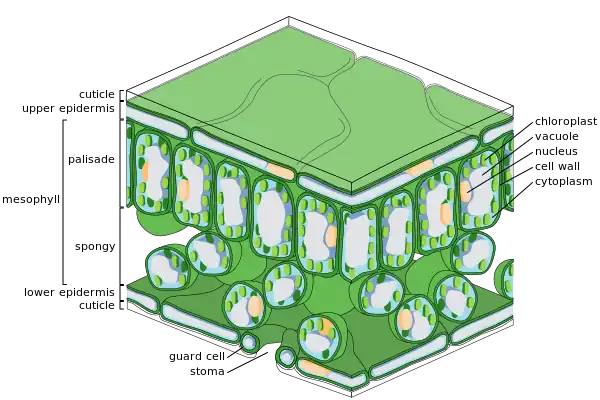
Palisade cells are plant cells located on the leaves, right below the epidermis and cuticle that is the outermost layer of the leaf. In simpler terms, they are known as leaf cells. Palisade means "stake" in Latin, they are vertically elongated and are stacked side by side, a different shape from the spongy mesophyll cells beneath them. The chloroplasts in these cells absorb a major portion of the light energy used by the leaf. Palisade cells occur in dicotyledonous plants, and also in the net-veined Monocots, the Araceae and Dioscoreaceae.
Structures
Palisade cells contain the largest number of chloroplasts per cell, which makes them the primary site of photosynthesis in the leaves of those plants that contain them, maximizing energy transfer, and converting the energy in light to the chemical energy of carbohydrates.
Beneath the palisade mesophyll are the spongy mesophyll cells, which also perform photosynthesis. They are irregularly shaped cells that have many intercellular spaces that allow the passage of gases. There are also guard cells that allow the gases to exchange. The guard cells are collectively known as a stoma derived from the Greek word meaning mouth and plural stomata.
References
Holt Science & Technology "Microorganisms, Fungi, and Plants", Holt, Rinehart and Winston
- McAlister, Dinah. “Palisade Cell Function.” Study.com | Take Online Courses. Earn College Credit. Research Schools, Degrees & Careers, 26 Jan. 2022.[1]
- Kozuka, Toshiaki, et al. “Tissue-Autonomous Promotion of Palisade Cell Development by Phototropin 2 in Arabidopsis.” The Plant Cell, American Society of Plant Biologists, Oct. 2011.[2]
- ↑ McAlister, Dinah. "Palisade Cell Function". study.com.
- ↑ Kozuka, Toshiaki; Kong, Sam-Geun; Doi, Michio; Shimazaki, Ken-ichiro; Nagatani, Akira (October 2011). "Tissue-Autonomous Promotion of Palisade Cell Development by Phototropin 2 in Arabidopsis[W]". The Plant Cell. 23 (10): 3684–3695. doi:10.1105/tpc.111.085852. ISSN 1040-4651. PMC 3229143. PMID 21972260.